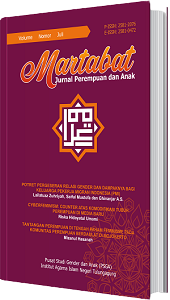Abstract
This research aims to understand the conflicts experienced by women in fulfilling the role of a mother while striving to remain active in fitness centers. Alongside the demands of the dual role as a mother and an individual concerned about health, many women experience conflicts between family responsibilities and the desire to engage in physical activity. This study employs a qualitative approach with data collection techniques such as observation, in-depth interviews, and literature review. The research participants are women with experience in navigating this dual role. The findings of this research reveal various factors contributing to women's conflicts in maintaining their health and fitness. These factors include tight time demands, limited social support, feelings of guilt, and body perceptions. Additionally, the study identifies strategies used by women to overcome these conflicts, such as scheduling wisely, seeking family support, and identifying personal priorities. This research provides valuable insights into the challenges faced by women in juggling the dual role of being a mother and an active individual in fitness. The results can be utilized to develop support programs and policies that encourage women in pursuing a healthy lifestyle while fulfilling their family responsibilities
References
Andreasson, Jesper, and Thomas Johansson. “Negotiating Female Fitness Doping: Gender, Identity and Transgressions.” Sport in Society 24, no. 3 (2021): 323–339. https://doi.org/10.1080/17430437.2019.1672152.
Barnes, Alyce T, Myles D Young, Elaine M Murtagh, E Clare, Ronald C Plotnikoff, and Philip J Morgan. “Effectiveness of Mother and Daughter Interventions Targeting Physical Activity, Fitness, Nutrition and Adiposity: A Systematic Review.” Preventive Medicine (2017): 1–39. https://doi.org/10.1016/j.ypmed.2017.12.033.
Bladh, Greta Helen. “Spatial Bodies: Vulnerable Inclusiveness within Gyms and Fitness Venues in Sweden.” Social Sciences 11, no. 10 (2022): 1–24.
Bootcov, Michelle. “Australian Female Endurance Cyclists of the 1930s and the Commercialization of Their Athletic Femininity.” International Journal of the History of Sport 36, no. 15–16 (2019): 1433–1456. https://doi.org/10.1080/09523367.2020.1713107.
Cislaghi, Beniamino, Shweta Bankar, Ravi Kumar Verma, Lori Heise, and Francis Group. “Widening Cracks in Patriarchy : Mothers and Daughters Navigating Gender Norms in a Mumbai Slum.” Culture, Health & Sexuality (2019): 1–18. https://doi.org/10.1080/13691058.2019.1580769.
Clark, Amy. “Exploring Women’s Embodied Experiences of ‘the Gaze’ in a Mix-Gendered Uk Gym.” Societies 8, no. 1 (2018): 1–19.
Coen, Stephanie E, Mark W Rosenberg, and Joyce Davidson. “‘It’s Gym, like g-y-m Not J-i-m:’ Exploring the Role of Place in the Gendering of Physical Activity.” Social Science & Medicine (2017): 1–33. https://doi.org/10.1016/j.socscimed.2017.10.036.
Craig, Lyn, and Judith E. Brown. “Feeling Rushed: Gendered Time Quality, Work Hours, Nonstandard Work Schedules, and Spousal Crossover.” Journal of Marriage and Family 79, no. 1 (2017): 225–242.
IHRSA Global Report. The 2022 IHRSA Global Report. Los Angeles: IHRSA Global Report, 2022.
Kelly, Maura, and Barbara Gurr. Feminist Research in Practice. Lanham: Rowman & Littlefield, 2019.
Lauersen, Jeppe Bo, Thor Einar Andersen, and Lars Bo Andersen. “Strength Training as Superior, Dose-Dependent and Safe Prevention of Acute and Overuse Sports Injuries: A Systematic Review, Qualitative Analysis and Meta-Analysis.” British Journal of Sports Medicine 52, no. 24 (2018): 1557–1563.
Lord, Rhiannon, and Mykolas Kavaliauskas. “Sociological Tools for Improving Women’s Representation and Experiences in Strength and Conditioning Coaching.” Strength and Conditioning Journal 45, no. 1 (2023): 40–48.
Maddox, Callie Batts, Jaime R. DeLuca, and Jacob J. Bustad. “Working a Third Shift: Physical Activity and Embodied Motherhood.” Sociological Inquiry 90, no. 3 (2020): 603–624.
Malm, Christer, Johan Jakobsson, and Andreas Isaksson. “Physical Activity and Sports—Real Health Benefits: A Review with Insight into the Public Health of Sweden.” Sports 7, no. 5 (2019): 1–28.
McGannon, Kerry R., Jenny McMahon, and Christine A. Gonsalves. “Juggling Motherhood and Sport: A Qualitative Study of the Negotiation of Competitive Recreational Athlete Mother Identities.” Psychology of Sport and Exercise 36, no. January (2018): 41–49. https://doi.org/10.1016/j.psychsport.2018.01.008.
Messing, Sven, Michael Krennerich, Karim Abu-Omar, Susanne Ferschl, and Peter Gelius. “Physical Activity as a Human Right?” Health and Human Rights 23, no. 2 (2021): 201–211.
Mola, Isabel Fontbona, and Ulf Wuggenig. “Female Bodybuilding and Patriarchal Civilization. The Intrusion of a Practice in Sport into Artistic Fields and Visual Culture.” In Arts and Power: Policies in and by the Arts, edited by Lisa Gaupp, Alenka Barber-Kersovan, and Volker Kirchberg. Springer Fachmedien Wiesbaden, 2022.
Perry-Jenkins, Maureen, and Naomi Gerstel. “Work and Family in the Second Decade of the 21st Century.” Journal of Marriage and Family 82, no. 1 (2020): 420–453.
Schofield, Katherine L., Holly Thorpe, and Stacy T. Sims. “Feminist Sociology Confluences With Sport Science: Insights, Contradictions, and Silences in Interviewing Elite Women Athletes About Low Energy Availability.” Journal of Sport and Social Issues 46, no. 3 (2022): 223–246.
Siegele, Jessica L., Robin Hardin, Elizabeth A. Taylor, and Allison B. Smith. “‘She Is the Best Female Coach’: Female Swimming Coaches’ Experiences of Sexism.” Journal of Intercollegiate Sport 13, no. 1 (2020): 93–118.
Tekavc, J, P Wylleman, and S Cecić Erpič. “Becoming a Mother-Athlete : Female Athletes ’ Transition to Motherhood in Slovenia.” Sport in Society (2020): 1–17. https://doi.org/10.1080/17430437.2020.1720200.
Toffoletti, Kim, and Holly Thorpe. “Bodies, Gender, and Digital Affect in Fitspiration Media.” Feminist Media Studies 21, no. 5 (2021): 822–839. https://doi.org/10.1080/14680777.2020.1713841.
World Health Organization. Global Action Plan on Physical Activity 2018-2030: More Active People for a Healthier World. Switzerland: World Health Organization, 2019.
Zipp, Sarah, Tavis Smith, and Simon Darnell. “Development, Gender and Sport: Theorizing a Feminist Practice of the Capabilities Approach in Sport for Development.” Journal of Sport Management 33, no. 5 (2019): 440–449.

This work is licensed under a Creative Commons Attribution-ShareAlike 4.0 International License.

